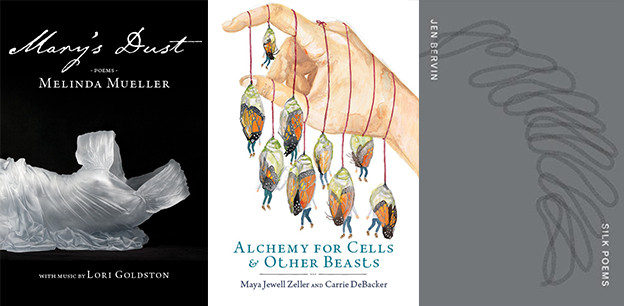
So she wrote
Brianne Alphonso

Brianne Alphonso on feminine histories, bodies, and rebirths.
Mary’s Dust, Melinda Mueller (Entre Ríos Books, 2017)
Mary is the soldier who disguised herself as a man; she is the archeologist digging for fossils and the French queen without a head: “even my lost sister / Mary, and Mary my mother, and Mary myself.” In Mary’s Dust, Mueller strings together a reclaimed history, not for kings or famous men, but for the Marys throughout time. “We all bled, didn’t we, / one way or another?” Ranging from the fourth century BCE well into the modern twentieth, these poems chart the stories of women, both remarkable and mundane, who were too frequently set aside as footnotes in textbooks. Each poem is unique to the story it tells; pieces range from classical sonnets to trial transcripts to mimicries of blues. It is the variety and beauty of these works that compel readers to take in the complex endurance of women for whom “in our near nothingness the music resonates.”
Alchemy for Cells & Other Beasts, Maya Jewell Zeller and Carrie DeBacker (Entre Ríos Books, 2017)
Alchemy is a book of “little spells” for unraveling the feminine body within a fluctuating environment. Zeller’s poems in conjunction with DeBacker’s watercolors show metamorphosed women who align themselves with the surrounding world: “I put on my blood / and it put me on. I was a scrub grub. A cold bug. A sharp blade.” In this way, the bizarre creatures of the book — so strange, yet somehow recognizable — arm themselves against politics, against the deprivatization of their bodies, and against their own impulsive cells. Alchemy attempts to peel back layers of tissue to extract an underlying need, a need that is “angry / & growing the exoskeleton / the need is already beating its wings.” Coming from an ecofeminist perspective, the book incorporates both the external influences of nature and the internal processes of body and mind to produce a collection of visual and highly vivid poetic verse.
Silk Poems, Jen Bervin (Nightboat Books, 2017)
These poems resemble silk — not as the luxurious sheets of fabric, but as the glutinous mass that solidifies into threads as strong as steel. Extensive research on the process of reverse-engineering silk serves as the inspiration for this project. Bervin reimagines lines of poetry as coded strands of DNA, short chains of six characters that twine together in patterns that tell the story of who and what we are. The blending of the words forces the reader to blend ideas, to question where one ends and the next begins, and to also question why we believed there was a definitive separation at all. In the style of a silk moth, Silk Poems illuminates a process of death and rebirth, where by changing skins we start again, continuous and ever-renewed.